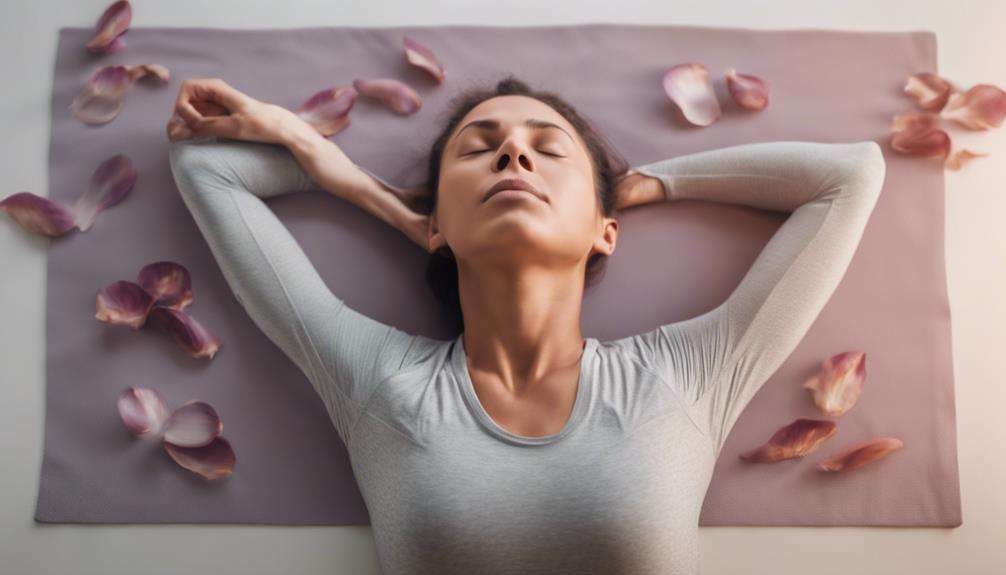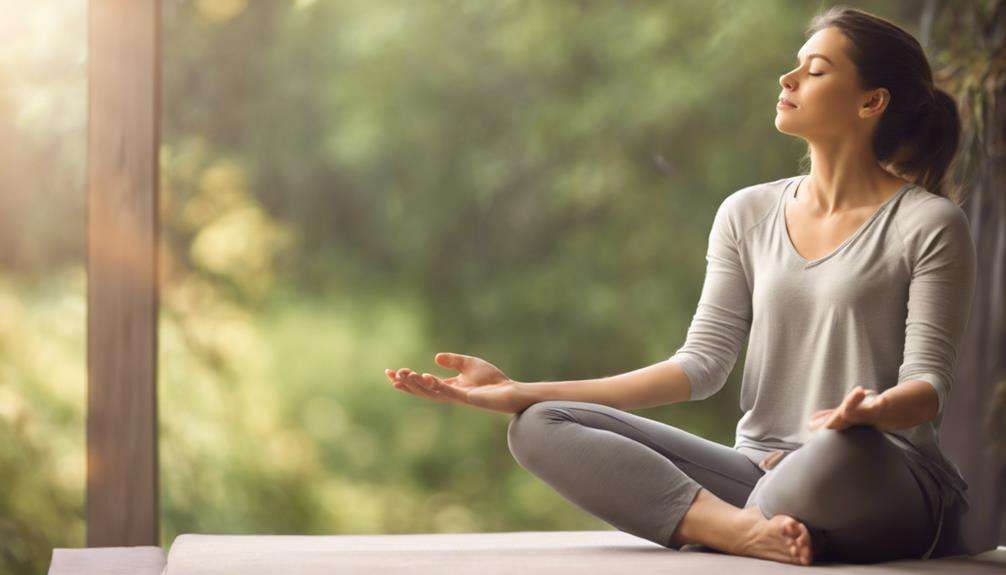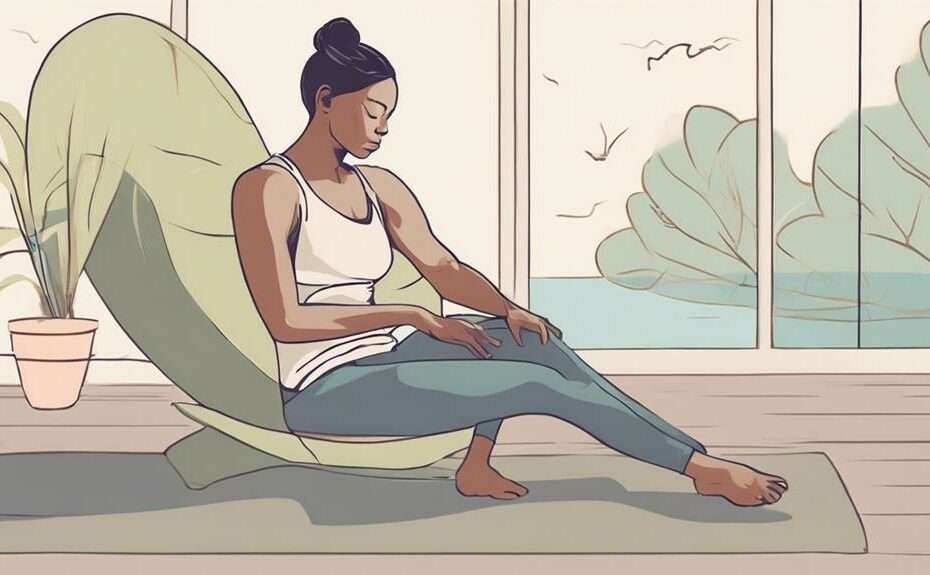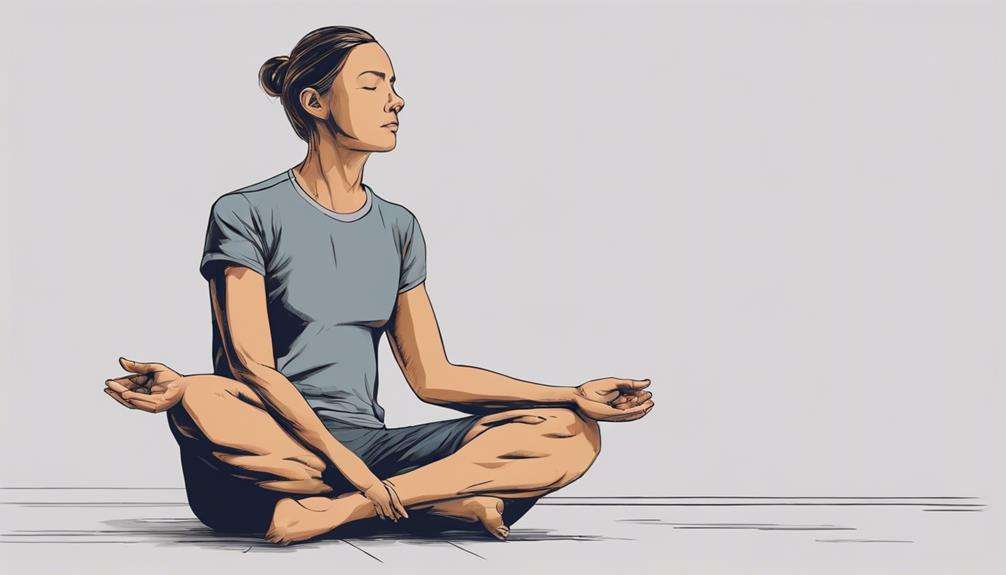As you unwind after a long day, you might be curious about the potential advantages of Progressive Muscle Relaxation (PMR).
This relaxation technique holds a multitude of benefits that could positively impact your well-being in various ways. From stress reduction to improved sleep quality, PMR offers a holistic approach to relaxation and mental wellness.
But what exactly are the specific benefits that PMR can provide, and how might they enhance your daily life?
Key Takeaways
- PMR reduces blood pressure and muscle tension, promoting physical and mental well-being.
- It effectively manages chronic pain and stress, enhancing overall quality of life.
- PMR improves sleep quality by calming the body and mind for restful sleep.
- As a complementary therapy, PMR aids in managing migraines, headaches, and stress-related conditions.
Understanding Progressive Muscle Relaxation
Understanding Progressive Muscle Relaxation can greatly enhance your ability to manage stress and promote relaxation effectively. Progressive Muscle Relaxation (PMR) involves the deliberate tensing and relaxing of specific muscle groups to induce physical and mental relaxation.
Developed by American physician Edmund Jacobson in the 1920s, PMR has become a popular non-drug approach to stress relief. By engaging in progressive muscle relaxation techniques, you can actively counteract the effects of the sympathetic nervous system, which is responsible for stress-related symptoms.
Studies have shown that practicing PMR can lead to a reduction in blood pressure, aid in the treatment of migraines and tension headaches, and enhance the quality of sleep. The benefits of PMR extend beyond just muscle relaxation; it also promotes states of relaxation, positively impacts the autonomic nervous system, and contributes to lowering blood pressure levels.
Incorporating progressive muscle relaxation into your routine can bring about significant improvements in your overall well-being.
Anxiety Relief Through Muscle Relaxation
To effectively combat anxiety and promote relaxation, incorporating Progressive Muscle Relaxation (PMR) techniques into your routine can be highly beneficial. PMR is a proven method for reducing anxiety by inducing a state of physical and mental calmness.
By consciously tensing and then relaxing different muscle groups, PMR helps release built-up tension, alleviating symptoms of anxiety and stress. Research suggests that PMR is an effective non-drug approach to managing anxiety disorders and improving overall well-being.
The intentional focus on relaxing each muscle group can help you become more aware of where you hold tension in your body, allowing you to release it and experience a greater sense of relaxation. By incorporating PMR into your daily routine, you can proactively address feelings of anxiety and stress, promoting a more peaceful state of mind and enhancing your overall quality of life.
Enhanced Relaxation Techniques

Exploring advanced methods for achieving deeper states of relaxation can further enhance the effectiveness of Progressive Muscle Relaxation (PMR) techniques. By incorporating enhanced relaxation techniques into your PMR practice, you can maximize the benefits for reducing stress, anxiety, and promoting overall relaxation.
Here are three ways to enhance your relaxation experience:
- Visualization: Pairing PMR with guided imagery or visualization exercises can help you create a calming mental image, further promoting relaxation and reducing stress and anxiety levels.
- Breathing Techniques: Incorporating diaphragmatic breathing techniques can enhance the relaxation effects of PMR by promoting deeper relaxation and reducing physiological arousal associated with stress.
- Mindfulness Meditation: Combining PMR with mindfulness meditation techniques can help you stay present in the moment, reducing anxious thoughts and promoting a deeper sense of relaxation.
Benefits for Sleep Quality
Improve your sleep patterns and enhance your relaxation response with Progressive Muscle Relaxation (PMR).
By incorporating PMR into your bedtime routine, you can unwind and release tension, promoting a peaceful switch into restful sleep.
Experience the calming effects of PMR on your body and mind, leading to a more relaxed state that encourages falling asleep and staying asleep.
Improved Sleep Patterns
Enhance your sleep quality through the practice of Progressive Muscle Relaxation (PMR), a technique proven to promote relaxation and reduce anxiety, leading to better rest.
When it comes to improved sleep patterns:
- PMR helps in relaxing your body and mind, making it easier to fall asleep.
- By reducing anxiety levels, PMR allows for deeper and more restful sleep.
- Practicing PMR before bedtime can alleviate physical tension and mental stress, contributing to an overall improvement in sleep duration and quality.
Incorporating PMR into your nightly routine can lead to a more peaceful and rejuvenating sleep experience. By systematically tensing and relaxing your muscles, you pave the way for a night of better sleep and improved well-being.
Enhanced Relaxation Response
To further improve your sleep quality, consider how Progressive Muscle Relaxation (PMR) enhances the relaxation response, leading to better rest and aiding in managing insomnia.
PMR promotes muscle relaxation, which triggers a heightened relaxation response in your body. This process can help calm your mind and body, making it easier to drift off to sleep peacefully.
Research indicates that practicing PMR before bedtime can improve sleep duration, decrease disturbances, reduce sleep onset latency, and enhance sleep efficiency. By incorporating PMR into your nightly routine, you can create a more conducive environment for deep, restorative sleep.
Embracing the benefits of PMR for enhanced relaxation response can contribute to a more restful and rejuvenating sleep experience, ultimately supporting your overall well-being.
Alleviating Physical Tension

By systematically tensing and relaxing muscle groups, Progressive Muscle Relaxation (PMR) effectively alleviates physical tension. This technique targets specific muscle groups to release muscle tension, promoting physical relaxation and comfort.
Here are three ways PMR helps in alleviating physical tension:
- Reducing Muscle Tightness: Through the process of tensing and then relaxing muscle groups, PMR helps reduce muscle tightness. This can lead to decreased stiffness and soreness in the muscles, enhancing overall physical relaxation.
- Promoting Relaxation and Comfort: Research has shown that PMR significantly decreases physical symptoms of stress and anxiety, such as muscle tension. By engaging in PMR regularly, you can experience a sense of relaxation and ease in your muscles.
- Enhancing Physical Well-being: Regular practice of PMR can improve flexibility, reduce muscle fatigue, and contribute to enhanced physical well-being. By targeting muscle groups systematically, PMR can help you achieve a more relaxed and comfortable state physically.
Managing Chronic Pain
Furthermore, Progressive Muscle Relaxation (PMR) proves to be a beneficial technique for managing chronic pain conditions, offering relief and improved quality of life to individuals suffering from persistent discomfort. Research indicates that PMR can be particularly helpful for individuals with chronic pain conditions such as fibromyalgia syndrome and temporomandibular joint disorders.
For those dealing with fibromyalgia syndrome, incorporating PMR into their daily routine has shown to alleviate pain symptoms and enhance overall well-being. Similarly, individuals with temporomandibular joint disorders have reported reduced levels of pain and increased ability to cope with their condition through regular PMR practice.
Additionally, PMR has demonstrated effectiveness in reducing tension headaches, which are common among individuals experiencing chronic head and neck pain. By incorporating PMR into your pain management strategies, you may experience relief from the discomfort associated with chronic joint or nerve pain conditions. Overall, practicing PMR has the potential to enhance your quality of life and alleviate the symptoms of various chronic pain conditions.
Mental Health Improvement

Managing chronic pain can lead to improved mental health, as Progressive Muscle Relaxation has been shown to reduce symptoms of anxiety, depression, and stress. Incorporating this practice into your routine can have significant benefits for your mental well-being.
Here's how Progressive Muscle Relaxation can help improve your mental health:
- Reducing Anxiety: By engaging in Progressive Muscle Relaxation, you can lower your anxiety levels and promote a sense of calmness and relaxation in your daily life.
- Alleviating Stress: Regular practice of Progressive Muscle Relaxation can help you manage stress more effectively, leading to better mental health outcomes and an improved ability to cope with challenging situations.
- Enhancing Mental Well-Being: Studies have demonstrated that Progressive Muscle Relaxation enhances feelings of well-being and quality of life, contributing to better overall mental health and a more positive outlook on life. By incorporating this technique into your daily routine, you can experience improved sleep quality and decreased feelings of anxiety, ultimately leading to a healthier state of mind.
Lowering Blood Pressure
Lowering blood pressure can be effectively achieved through the practice of Progressive Muscle Relaxation (PMR), a technique known to benefit cardiovascular health. Studies have shown that regular PMR sessions lead to notable reductions in both systolic and diastolic blood pressure levels. This reduction is particularly important for individuals with hypertension, as the relaxation and stress-reducing effects of PMR play a vital role in managing blood pressure. By inducing relaxation and lowering stress levels, PMR helps decrease blood pressure readings, making it a valuable tool in addressing hypertension.
Additionally, PMR's impact on the autonomic nervous system contributes to regulating blood pressure, further highlighting its significance for individuals looking to lower their blood pressure levels. The physiological effects of PMR make it a practical and accessible method for improving cardiovascular health and managing hypertension. Incorporating PMR into your routine can play a key role in promoting overall well-being and reducing the risks associated with high blood pressure.
Complementary Therapy for Migraines

If you suffer from migraines, consider the benefits of Progressive Muscle Relaxation (PMR) as a complementary therapy.
This technique can help you reduce muscle tension, manage stress, and potentially alleviate migraine symptoms.
Migraine Relief Techniques
Exploring the advantages of Progressive Muscle Relaxation (PMR), exploring complementary therapy options for managing migraines can provide valuable insights into effective relief techniques. When it comes to migraine relief techniques, incorporating PMR into your routine can be highly advantageous.
Here are some techniques to explore:
- Deep Breathing Exercises: Practice deep breathing techniques to help reduce stress and tension, which can be beneficial for managing migraines.
- Guided Imagery: Engage in guided imagery sessions to promote relaxation and reduce the intensity of migraine attacks.
- Mindfulness Meditation: Regular mindfulness meditation can help alleviate migraine symptoms by promoting relaxation and reducing overall stress levels.
Muscle Tension Reduction
Incorporating Progressive Muscle Relaxation (PMR) techniques can effectively reduce muscle tension, providing a valuable complementary therapy for managing migraines and tension headaches. By targeting muscle tension, PMR offers a holistic approach to alleviating migraines naturally.
Research indicates that PMR can decrease the frequency of migraines by promoting muscle relaxation and reducing overall tension in the body. This non-pharmacological method helps individuals experience relief and lower the intensity of migraine episodes.
Integrating PMR into your routine can assist in managing migraines and minimizing their impact on your daily life, ultimately enhancing your quality of life. Consider using PMR as a proactive strategy to reduce muscle tension and find relief from migraines in a holistic manner.
Stress Management Tool
Progressive Muscle Relaxation (PMR) functions as a beneficial complementary therapy for managing migraines, aiding in stress management and reducing headache frequency. When utilized as a stress management tool in migraine management, PMR offers several advantages:
- Reduction in Migraine Frequency: By incorporating PMR into your routine, you may experience a decrease in the frequency of migraine attacks, providing relief from debilitating symptoms.
- Stress Reduction: PMR helps lower stress levels, a common trigger for migraines, contributing to better management of these severe headaches.
- Enhanced Relaxation Techniques: The relaxation induced by PMR can alleviate tension, potentially reducing the severity of migraines and enhancing your overall quality of life.
Promoting Overall Well-being

To enhance your overall well-being, incorporating Progressive Muscle Relaxation (PMR) into your routine can help alleviate stress, anxiety, and tension in your body. By engaging in PMR, you actively participate in relaxation techniques that promote stress reduction and mental health. Studies have shown that PMR not only reduces symptoms of anxiety and depression but also enhances your quality of life by providing a sense of calm and tranquility.
Additionally, the practice of PMR has been associated with lower blood pressure readings, making it a valuable tool for individuals dealing with hypertension. Furthermore, if you struggle with chronic pain conditions like joint or nerve pain, PMR can effectively manage these by promoting relaxation and reducing muscle tension. This holistic approach not only targets physical symptoms but also contributes to improved sleep quality, ultimately benefiting your overall well-being and promoting a state of relaxation and well-being.
Frequently Asked Questions
What Are Negatives to Progressive Muscle Relaxation?
When considering Progressive Muscle Relaxation, be aware of potential side effects like initial arousal increase, limitations for those with mobility issues, and drawbacks of time commitment for long-term benefits. Consult a healthcare provider if needed.
How Does Progressive Muscle Relaxation Improve Performance?
To improve performance, progressive muscle relaxation increases focus and concentration. It enhances flexibility, reduces tension, and boosts recovery for better sleep. Regular practice benefits athletes with improved overall performance and reduced injury risk.
How Often Should You Do Progressive Muscle Relaxation?
For best results, practice Progressive Muscle Relaxation daily for 10-20 minutes. Tailor the frequency to suit your needs; some find it helpful in their morning or bedtime routines. Consistent sessions can reduce stress, improve sleep, and enhance well-being.
How Does Progressive Relaxation Make You Feel?
When you engage in Progressive Muscle Relaxation, you may feel an immediate sense of calmness and peace. Your mind-body connection strengthens, stress melts away, and your body experiences deep physical relaxation. Embrace these positive sensations.
Conclusion
So there you have it – just relax those muscles and watch all your worries melt away.
Who knew that something as simple as tensing and releasing could have such a profound impact on your well-being?
It's almost too easy, isn't it? Just a few minutes of progressive muscle relaxation each day can make all the difference.
So go ahead, give it a try and see for yourself – you might be surprised at how effective it can be.






